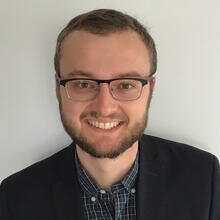As an Assistant Scientist at Argonne National Laboratory in Chicago, theoretical chemist Nick Jackson developed a computational technique called electronic coarse graining (ECG). Now, he brings that technique, along with broader expertise in multiscale simulations, to the Department of Chemistry where he officially joined the faculty in January as a member of the Center for Theoretical Chemistry.
“I’m a chemical scientist for sure but running through all of my research is the theme of machine learning applications,” Jackson said.
He used ideas from machine learning to develop his ECG technique, which substantially boosts the scale over which one can do electronic property calculations of condensed phase systems.
“Effectively making electronic calculations bigger and faster and more available,” he explained.
A California native, Jackson earned his bachelor’s in physics in 2011 and completed his PhD at Northwestern University as a National Science Foundation Graduate Research Fellow and Northwestern Presidential Fellow. In 2016 he received his PhD in theoretical and computational chemistry studying optoelectronic processes in semiconducting polymers and small molecules and went on to accept a Maria Goeppert Mayer Fellowship at Argonne National Laboratory. In 2019 he was promoted to an assistant scientist in the Materials Science Division at Argonne.
Jackson will also be an affiliate faculty member in the Department of Chemical and Biomolecular Engineering at Illinois.
“I’m excited to get started,” said Jackson, who has two graduate students onboard his research group. He continues to recruit others and prepares for Jan. 25, when he begins teaching Chem 442, an undergraduate physical chemistry course.
“That will be interesting, totally online,” he said. “It’s probably not the way a professor wants to start off the teaching experience, but the subject is something that I find very natural and have a fun time doing. And actually, that’s one of the classes when I was an undergrad that got me interested in going to grad school, so there are some good feelings there, and I’m excited to teach it.”
A theoretical and computational soft materials research group, The Jackson Lab will integrate molecular quantum mechanics, computational statistical mechanics and machine learning to characterize the multiscale structure and function of soft materials with applications in optoelectronics, bioelectronics and sustainability.
Some applications that would in theory benefit from his lab’s research would be flexible electronics, like bendable phones and OLED screens. Jackson said he’s also very interested in the application of degradability, for example how to model degradable or recyclable polymers.
“Which is very important these days,” said Jackson, who mentioned an example of another possible application of his lab’s future research to the issue of plastics that are polluting the oceans. “If you have all these things floating around in the ocean, what kind of conditions do I need to break all these bonds so they decompose into something that we can effectively reuse?”
Jackson said he looks forward to collaborating with other researchers on campus.
“The big benefit of Illinois is the intellectual diversity,” said Jackson, adding that long-term he expects all the interactions with other researchers to strongly influence his research interests and take them in new directions. “And that’s, of course, the big appeal of joining a department that’s as broad and excellent as UIUC.”
